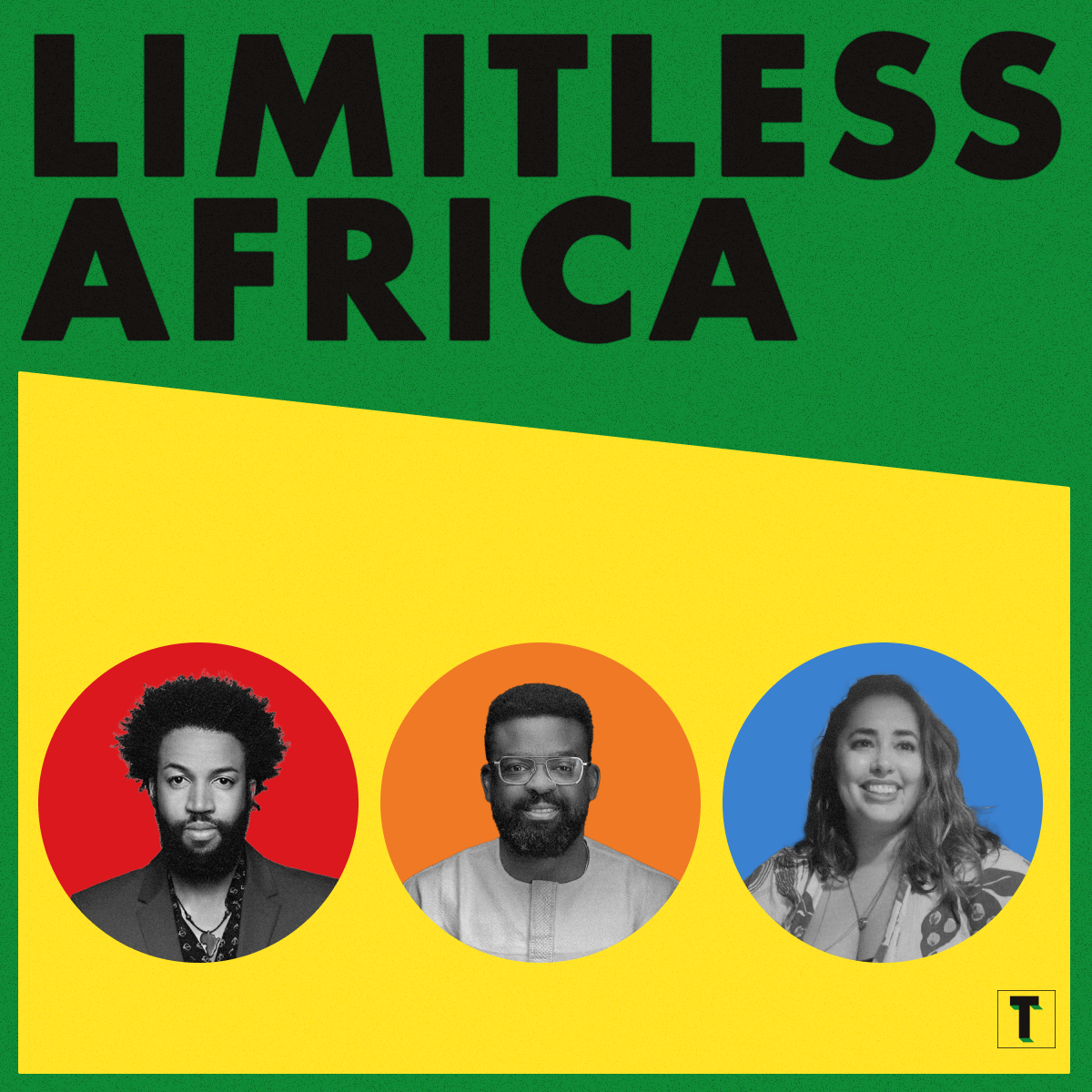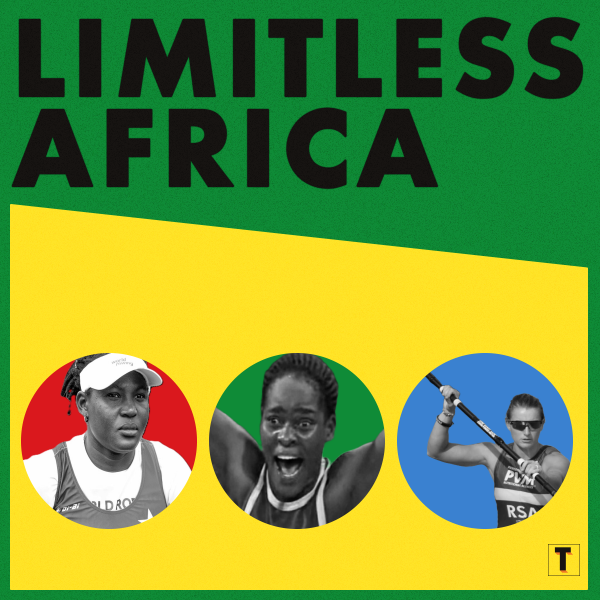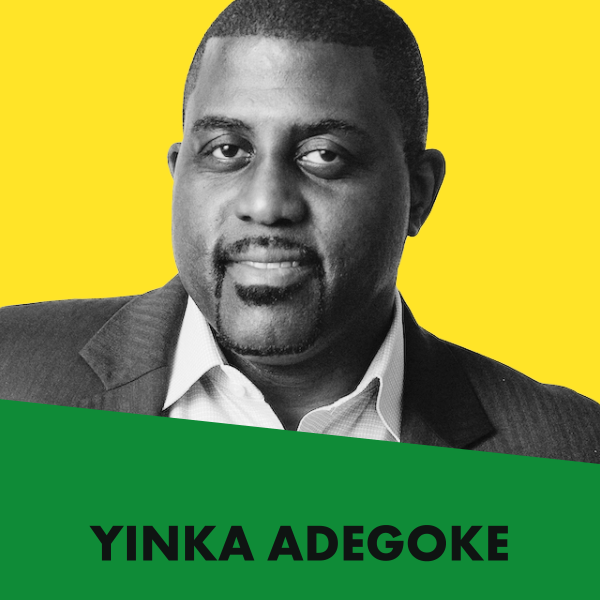Are African films going to take over streaming?
With guests denim richards, kunle afolayan, Samira Vera-Cruz

Episode notes
How can we make money for ourselves, not the fat cats in Hollywood?
Transcript
Streaming is becoming more popular in Africa but platforms like Netflix, Showmax and Amazon Prime Video are still pushing a lot of Western content. We asked a Nollywood producer, a Hollywood star, and an arthouse film director: Can we get more African storytelling on these digital streaming platforms? And how can we make money for ourselves, not the fat cats in Hollywood?
Denim Ri...
Streaming is becoming more popular in Africa but platforms like Netflix, Showmax and Amazon Prime Video are still pushing a lot of Western content. We asked a Nollywood producer, a Hollywood star, and an arthouse film director: Can we get more African storytelling on these digital streaming platforms? And how can we make money for ourselves, not the fat cats in Hollywood?
Denim Richards is an actor in the hugely popular US TV series Yellowstone.
Samira Vera-Cruz is a Cape Verdean independent film director, producer and actress.
Kunle Afolayan is one of Nollywood’s most successful directors and producers, signing a three-film deal with Netflix in 2021.
Let us know what you think about the episode here.
TRANSCRIPT
Are African films going to take over streaming?
In this episode we’re talking streaming and Africa
“So it just depends on what your risk appetite is and this is why. I talk so much about the business of entertainment. Ah because it’s entertaining sometimes but it’s a business all the time”
“We need to have producers who can apply pressure so that these films have the greatest international visibility.”
“We have had a lot of people here to work and these are people who I saw on Instagram.”
Claude:
Africa is a place of digital creativity – be it in art, music or film. Streaming is making slow inroads on the continent – more people are signing up to platforms like Netflix, Showmax and Amazon Prime Video.
However, these platforms are still pushing a lot of western content. I talk to a Nollywood producer, a Hollywood star, and an independent film director.
I asked them: How can we make sure that African storytelling is represented on these digital streaming platforms? And how can we make money for ourselves, not the fat cats in Hollywood?
Denim Richards is our Hollywood star. He’s an actor in the hugely popular US TV series Yellowstone. He moved to Botswana a couple of years ago and has just been named Director for Media Arts and Culture for the African Union. Here’s our conversation:
From your perspective, do you think African storytelling is going to take over streaming in the way that perhaps the audio streaming platforms really pushed afro beats.
Denim:
I would say yes. But I think that we have to be very accurate about how we approach streaming right?
I think all over the world, television, film… Everybody has like run towards streaming, like everybody is like we’re all in on streaming, and then what happened was kind of like a roller coaster.
We have to decide and this is a conversation for the individual or the individual that has a company or a corporation or production company. How do you want to be a part of this next kind of wave of entertainment coming from the continent?
What do I mean by that? What I mean when I say that is: you have the opportunity where yes you can get something commissioned (right, some of your viewers may not know but commissioning means that a corporation is essentially paying for your product right to be able to air your product on their platforms), right? But if they commission it, they’re gonna own the IP yeah they own the IP right? The intellectual property.
So you as the passionate artist you now have this great idea, you finally now have these platforms or these streaming services that are now giving you all the attention, more attention that you could ever dreamed of, and now they want to commission your product or your project…but they’re going to own it… So you have to decide for yourself: are you OK with that? Because, essentially, what you’re doing is that you’re essentially saying okay I created this IP, how much is my IP worth, putting it up for sale, and then essentially I’m now going to work for this streaming service on this product. So that’s one tranche.
And there’s a lot of people that that works for right. They don’t want to get into any other part of the game. They just want to create and that’s it. And that’s great and I think that there’s a tremendous amount of room for those types of opportunities.
On the other side of it, when you’re saying well, no, I’ve created these projects, I would like to own the intellectual property because I know that intellectual property is a two point six trillion dollar industry and there’s a lot of money to be made from that.
Ah maybe what I’m going to have to do is that I would love for you to maybe be the distributor of my content right? But instead of you commissioning it, maybe you could do distribution or licensing it which then means that I’m going to have to come up with the money from the outside. Right?
So I’m going to have to essentially find other financial institutions, other opportunities, to be able to have this be a finished product. Then I could take it to the streamers and say okay, you can license it for this period of time, you could do distribution.
So it just depends on what your risk appetite is and this is why I talk so much about the business of entertainment. Because it’s entertaining sometimes but it’s a business all the time
Claude:
Samira Vera-Cruz is a Cape Verdean film director, producer, actress and self-starter. Her debut feature film was made with no financing. She works with fellow filmmakers to promote production and distribution in Lusophone speaking countries. Our journalist Nekane de Ozamiz spoke to her.
Nekane:
Will streaming help African narratives reach further?
Samira:
The film Rescue from Mozambique comes to mind. It was selected for Netflix. That is something unprecedented for our country and it’s really interesting.
Netflix, for example, and it’s just an example, there are other platforms, obviously… but it has a relationship with South Africa. And with Nigeria, Ghana… It’s always the same.
But it’s up to us to also carve out these corridors so we can approach these platforms ourselves. We need to have producers who can apply pressure so that these films have the greatest international visibility.
Lately, and also on Netflix, there have been quite a few interesting series and short films to do with folklore and myths.
So, you can see already, there have been productions created, written, and produced by Africans that have had international success.
And we just need to mention the phenomenon that is Kunle Afolayan, from Nigeria.
He is a phenomenon, he has at least six, actually I think there are more, productions that have had immense international success on Netflix.
I remember that one of his films, Citation, was even on the list of most viewed films worldwide.
And,then, there are international productions that are executively produced by the US, in this case. And there are series too. Disney, for example, recently, produced Queens, which is a very interesting show. It not only about Africa, but is a interesting example. It is a programme about animal species in different countries and some of those animals are on the African continent.
In fact, I saw the premiere, which was about elephants, for example,
You might ask why I find that interesting?
Because they involved teams in each of these countries, using women, directors of photography, from these countries. It is also interesting to begin to understand
how collaborative formats can be an interesting way for us to tell our stories, not turning our backs on the rest of the world.
Because at the end of the day we want our narratives to spread. And we no longer want to be seen with that poor guy’s magnifying glass.
We need to start thinking about how our narratives also reflect women, the African woman, the Cape Verdean woman, the woman of the world…
And begin to understand how our problems here on the African continent are not necessarily exclusively ours. Sometimes someone in the Philippines, say, sees a film and may feel represented. And they will be able to solve a problem they have because they have seen that same problem depicted in the film.
So, we need to begin to understand our own identity and how African narratives can bring solutions on an international level.
Claude:
Samira mentioned Kunle Afolayan, one of Nollywood’s most successful actors, directors and producers. He signed a three film deal with Netflix in 2021. I was lucky enough to speak to him. Here’s our conversation.
Kunle Afolayan, welcome to Limitless Africa.
What do you see happening for African film in this new world of streaming over the next say five years?
Kunle:
Well I think it’s going to get better. One, Netflix is not the only 1 operating in Nigeria, now you have Amazon and you have a lot of people like you know trying to come in. Why are they coming? It’s because there’s something here and it means it’s because there’s something in in Africa, something in the continent.
So again, if we have some of these guys who are investors but at the same time who allow you to stay creative and do your thing without necessarily controlling how you tell your narrative then I think it’s a great thing for Nigeria and for Africa.
Unlike before, where most of the francophone films were funded by Europe, France Germany Belgium and all. And most of these films, yes they had great production value. But even the the citizens and indigens of all of those countries actually don’t get to see the films. They don’t even know nothing about the films. So these films only travel to festivals.
But the kind of structure we have in Nigeria is like what shows is what is obtainable or what runs in hollywood. Or filmmakers want to make films and then they find a way to make sure that it screens.
There used to be what we call ‘travelling cinema’ in Nigeria where people will make their film then they’ll buy their own 16 millimetre projector and they travel around the country and you know even extend it to like you know West Coast like ah Benin republic, Abidjan, Togo and all of that, traveling with all of these films and have them subtitled in french and sometimes portuguese you know and that was that that has always been like you know our own system of operation and that is like the same thing we’re doing now.
But the good thing is a lot of other African countries are then seeing that this model works. If not, if you’re a filmmaker and you only rely on grants, it means you probably will be able to do one film in five years or you do one film in 10 years. How many years do you actually have to live like actively?
But then if you like you know, go out use your money, people don’t know I I’ve used my money to make film, taking bank loans, which is actually against the ethics of film funding but I’ve always looked for every possible ways you know to fund films before this Netflix intervention and partnership came.
The Nigerian spirit in me, you know it’s always you know in the forefront. And what I mean by this is the fact that once I conceive an idea, I don’t wait, I just want to run with it. And I’ve done this over the years. Doing one film in one year is actually is like a luxury. In Nigeria some people do like five films in 1 year but of course there are different levels and different categories of film. Before the Netflix partnership and deal, it actually used to take me 2 years to make one film. And this was because here, especially in countries like Nigeria, in an industry like the Nigeria film industry, you are the producer and then you are also the executive producer. You have to look for funds. We don’t really have access to grants and all of that. So if you really want to do something big, it typically would take time but when Netflix came that helped you know in a lot of ways because um, the partnership allows you to focus on your creativity. And then they come forward with some level of funding.
So I think in the next five years it’ll be safe to say that um, there’ll be more young filmmakers doing great things.
Claude:
I guess for the new generation of filmmakers who do have access to Youtube and so on, the advice is is really to utilize these platforms right? And to build an audience in that way.
Kunle:
Yeah, yeah, that’s that’s that’s that’s the way now it’s um, look Youtube is like I know people in Nigeria who are making films straight to to Youtube,
And they’re making money and all of that. But then you need to first ask yourself what kind of filmmaker do you want to be? How do you want to be remembered? How do you want to be seen as a filmmaker? Do you want to … and I say this to film students all the time: The first thing when you’re going in, is to say: what kind of films do I want to be making? do I want to be a festival rat? Do I want to just make films and go to small circles and discuss the films and you know and all of that. Or I want to do film for just my community? Or I want to do a film that people can see you know locally and internationally?
So your approach to things would determine where you’re actually gonna end up. So I’ll say to them that first decide who are you making your film for and that would then help to channel all your ideology and everything.
You need to champion a cause. And this is championing means that you need to convince people who will listen to you and see sense and value in whatever it is you’re pitching. And once you’re able to do that people will fall. You have to of course put in a lot yourself. Um. And that’s I’ll say start with a short film. And then from there… I’ve had a lot of people here to work and these are people who I saw on Instagram maybe I just saw something you you’ve done. And for me that is enough to want to give you a chance or give you an opportunity,
We are partnering with a lot of young filmmakers to executively help produce their films. You know and all of that. So that’s what I’ll say to any young person, I stay start small but then dream but dream with your eyes open.
Claude:
The opportunities for African storytelling are Limitless. Especially in this interconnected digital world. But we Africans have to educate ourselves. We are entrepreneurs as well as artists. Our ideas, talent and creativity can make serious money. It’s up to us to make sure it doesn’t end up in someone else’s pocket.
Listen next
"Nigeria is hot with fast girls" - The sprinters going for Olympic Gold
With guests: Favour Ofili, Olayinka Olajide, Rosemary Chukwuma, Tiana Eyakpobeyan
LISTEN NOW 17 min
Can sport change women's lives?
With guests: Akoko Komlanvi, Alcinda Helena Panguana, Esti Olivier
LISTEN NOW 15 min








